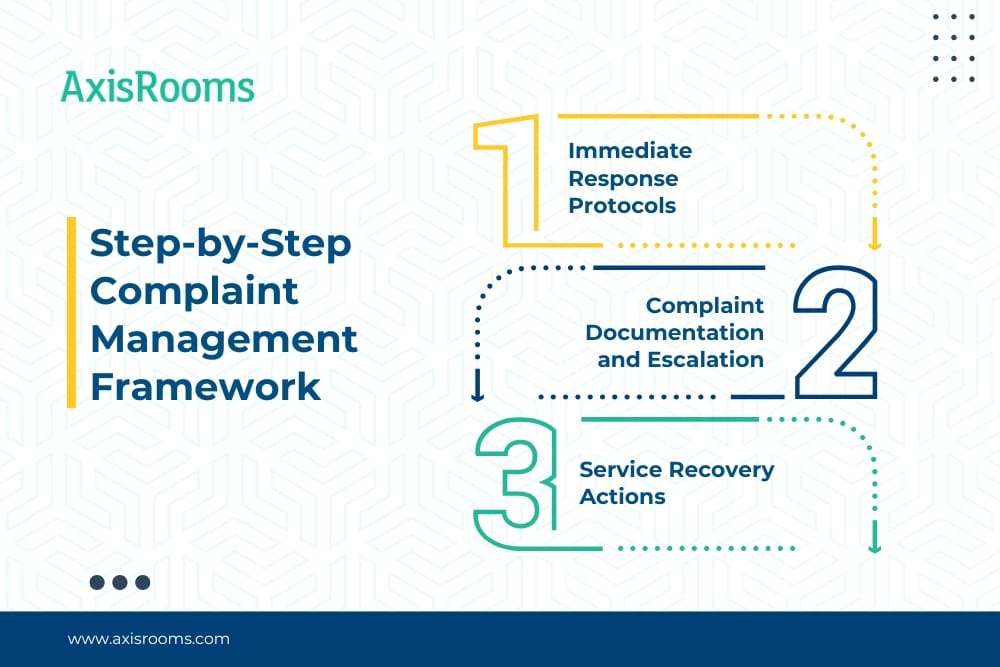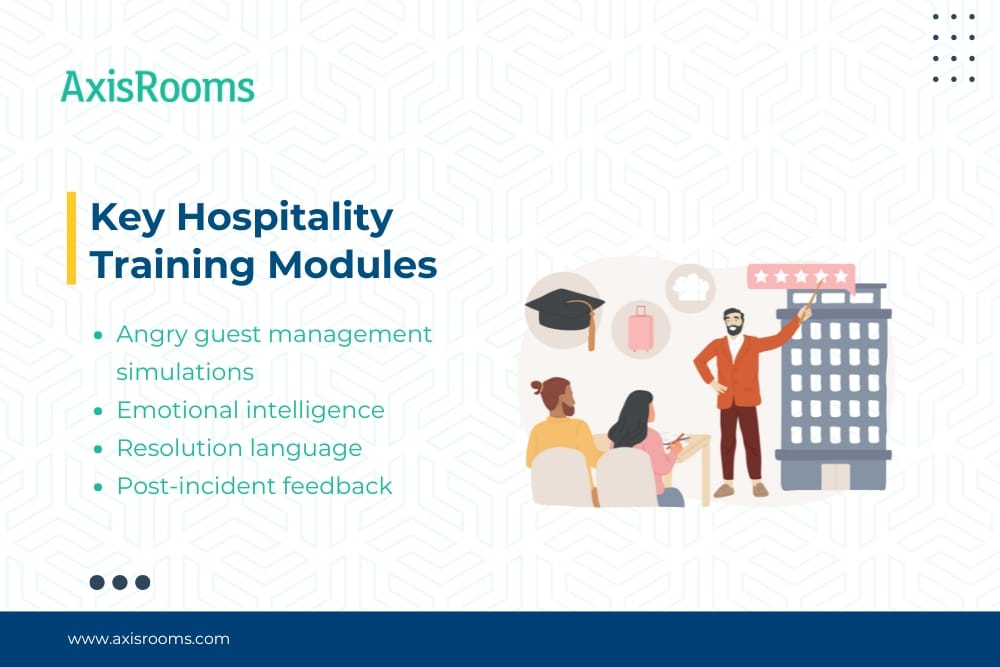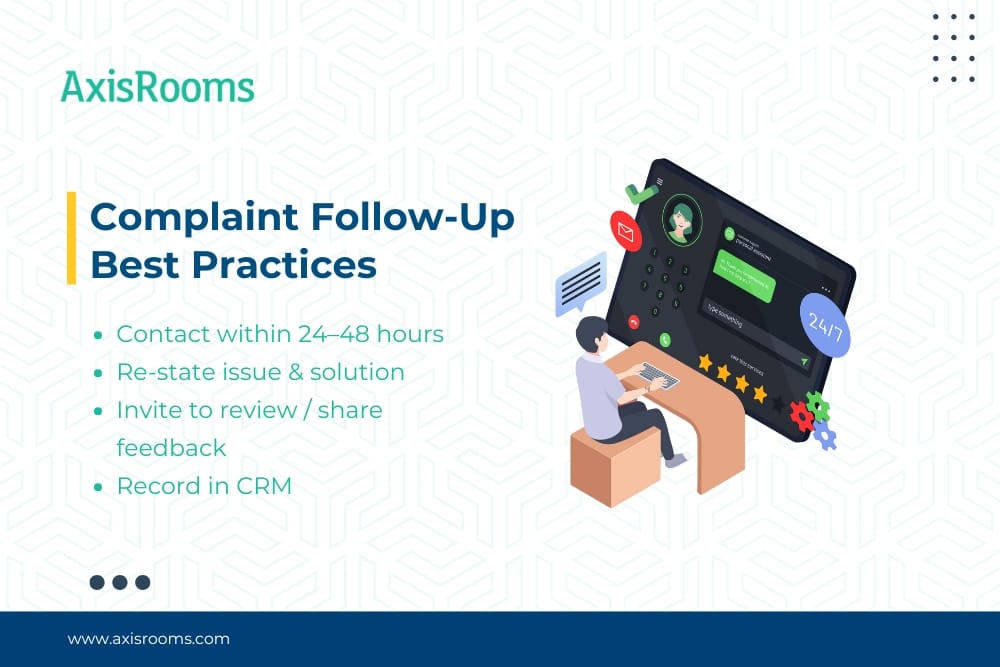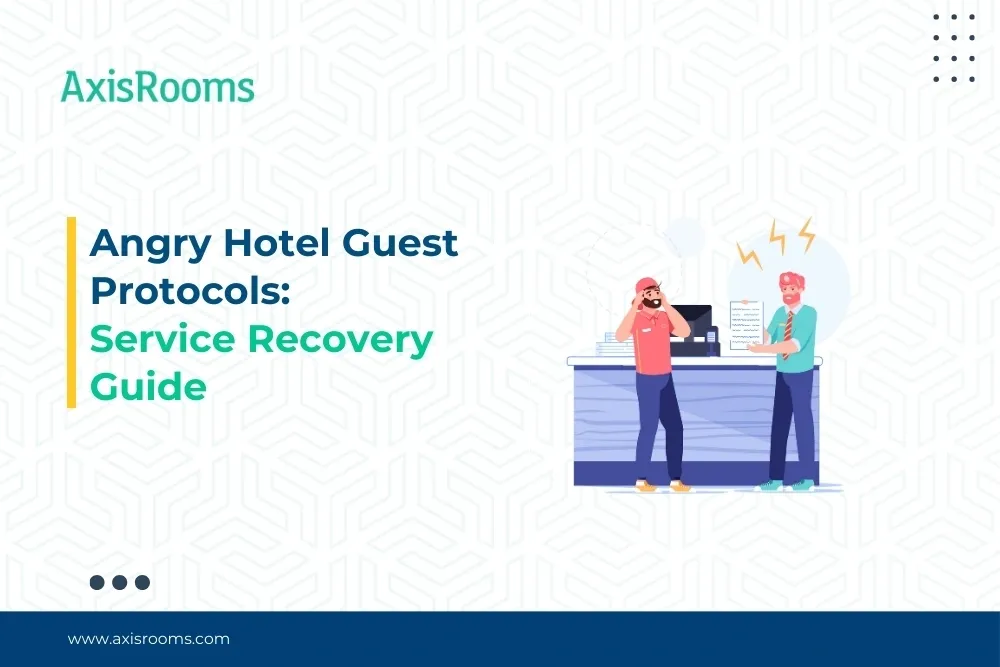Angry hotel guests aren’t just a hospitality headache—they’re a hidden opportunity. Handled well, a complaint can transform frustration into loyalty, a negative review into a glowing recommendation, and a loss into repeat revenue.
In this guide, we outline the best practices that hoteliers can implement to manage guest complaints with confidence and compassion. Backed by Axisrooms’ integrated tools, this approach to angry hotel guests is designed to maximize guest recovery, streamline resolution processes, and strengthen your hotel’s brand and booking engine performance.
Why Proactive Complaint Protocols Matter
Most complaints escalate not because of what went wrong—but because of how it's handled. A proactive complaint protocol ensures that guest complaints are acknowledged and resolved swiftly, avoiding negative sentiment online and lost business.
In the age of online reviews, your hotel booking engine isn’t just a transactional tool—it’s your reputation in action. Every resolved complaint protects your conversion rate and contributes to revenue recovery.
Proactive service recovery is also a hallmark of high-performing properties. It boosts operational consistency, reinforces team confidence, and reduces staff burnout from unexpected escalations. Moreover, it's an essential part of a resilient hotel revenue strategy—helping hoteliers protect margins by retaining guests they might otherwise lose.
Step-by-Step Complaint Management Framework

1. Immediate Response Protocols
Train your frontline staff in active listening in hotels, empathy, and conflict de-escalation. Simple techniques like maintaining eye contact, repeating back concerns, and validating emotions can immediately ease tension.
2. Complaint Documentation and Escalation
Use a centralized logging system (integrated with your PMS or CRM) to ensure every issue is tracked. Axisrooms tools allow you to:
- Automatically assign tickets to department heads.
- Set resolution timeframes based on severity.
- Monitor status in real-time for accountability.
Well-executed PMS integrations can help ensure all complaints are visible to relevant staff in real time—reducing delays and manual miscommunication.
3. Service Recovery Actions
Offer personalized recovery gestures: free room upgrades, complimentary services, late check-outs, or discounts. Ensure recovery isn’t just reactive, but sincere and memorable. Empower your team to act without needing manager approval for standard gestures.
Key Hospitality Training Modules

Effective complaint handling begins with confident, prepared staff. Incorporate these modules into your hospitality training and hotel staff training plans:
- Angry guest management simulations: Role-play different anger triggers (e.g., billing disputes, cleanliness, delays).
- Emotional intelligence: Recognizing signs of escalation early.
- Resolution language: Phrases that defuse tension (“I understand how that must feel”).
- Post-incident feedback: Let team members review outcomes and improve responses collaboratively.
Make training bite-sized and recurring. Reinforce skills through daily huddles or digital learning platforms.
Tech-Enabled Tools & Axisrooms Integration
- Hotel booking engine transparency: Ensure rate clarity and booking confirmation reduce booking confusion.
- Complaint ticketing automation: Auto-log issues via email, app, or staff dashboard.
- Smart follow-up: Set automated reminders to close the loop with guests.
- Analytics dashboards: Track top complaint categories, average resolution times, and staff performance.
When systems are unified, your team can move faster and more consistently—turning complaints into structured responses.
Complaint Follow-Up Best Practices

Resolution doesn’t end with an apology. Following up demonstrates genuine care and can reverse negative sentiment. Best practices include:
- Contacting the guest within 24–48 hours of resolution.
- Re-stating the issue, the solution provided, and thanking them for their feedback.
- Inviting them to review their stay—or share more feedback privately if unsatisfied.
- Recording the interaction in your CRM to personalize future stays.
Use Axisrooms’ post-stay email automation to ensure no guest leaves without being heard.
Measuring Impact on Revenue & Reviews
Every recovered guest contributes to the bottom line. With structured protocols and tech integration, hotels can:
- Reduce 1-star reviews that damage booking confidence.
- Convert angry guests into returning customers—often at a higher value.
- Improve guest service recovery metrics: time-to-resolution, guest satisfaction scores, and Net Promoter Score (NPS).
- Improve hotel booking engine trust by maintaining 4.5+ average ratings.
Some Axisrooms clients have recovered up to 70% of dissatisfied guests by using proactive workflows—translating directly into tens of thousands in recovered bookings.
Conclusion
Managing angry hotel guests is no longer just a soft-skill—it's a structured business process. By combining empathetic staff training with integrated tech tools, hotels can resolve complaints faster, recover more guests, and protect their long-term revenue.
Now is the time to turn every complaint into a competitive advantage. With Axisrooms, you can launch a full guest service recovery system—backed by automation, data, and consistency.
Explore Axisrooms’ solutions today and build a culture where every complaint creates loyalty.


